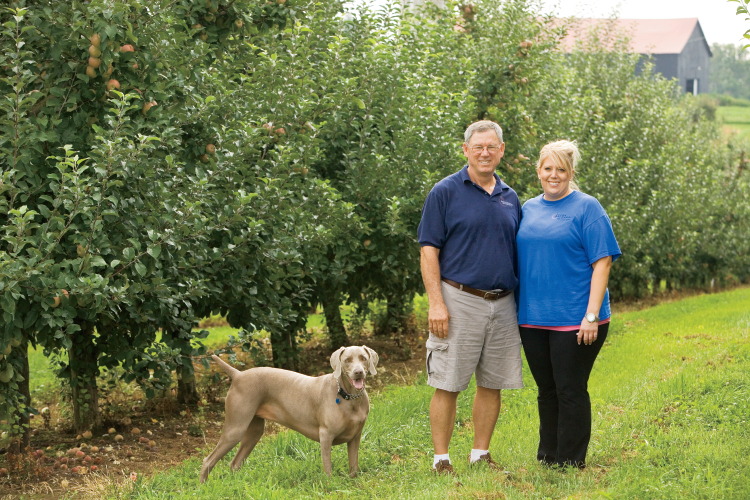Home > Kentucky > Kentucky Agritourism > Visitors Experience Life on the Farm in Kentucky
Visitors Experience Life on the Farm in Kentucky
As someone who grew up on a farm, Kevan Evans still admits to being surprised by something he sees almost every day.
It’s the crowd of people who come to visit Evans Orchard and Cider Mill, the Georgetown operation he runs with his family.
Evans’ great-great-grandfather started the farm as a place to grow tobacco and raise cattle. Evans’ family ventured into agritourism in the 1990s, when they opened their farm to school tours and as a U-pick operation. The farm is now a destination for many families and school groups looking for U-pick opportunities, seasonal festivals or just fresh fruits and vegetables available at the on-site market.
“I was raised on a farm, so I know about that lifestyle,” says Evans, who operates Evans Orchard with his wife Sue and daughter Jenny. “But people who don’t have a farming background really enjoy getting out and visiting a farm. It’s amazing to see how many people enjoy doing something that I’ve always just taken for granted.”
More farmers and producers in Kentucky gladly let people on their farms as they start to look at agritourism as a viable way not only to keep a family farm but also to make a living. The definition of agritourism by the Commonwealth of Kentucky is “the act of visiting a working farm or any agricultural, horticultural or agribusiness operations for the purpose of enjoyment, education or active involvement in the activities of the farm or operation.”
And Kentucky has a multitude of examples that fall under that definition, from trail rides and dude ranches to tours of distilleries and wineries. Other types of agritourism include farm-stays (similar to bed-and-breakfasts), corn mazes, barn dances and other forms of entertainment.
“There are more than 400 agritourism sites in Kentucky, and that continues to grow,” says Amelia Wilson, the Kentucky Department of Agriculture’s director of agritourism. “Most are fourth or fifth generation farmers. A lot of these are looking for alternative means of income, but also looking for ways to keep their family farms.”
This was the case with the Evans family farm. Like many farmers in Kentucky, Evans began getting out of tobacco production and started growing vegetables and fruits. His farm and gift market was once the tobacco barn.
“The driving force of our business now is agritourism, and it has really been that way the past few years,” Evans says. “That end of it is actually growing more than the production end.”
Mark Haney is seeing a similar experience with the Haney’s Appledale Farm he owns with his brother Don. Dating to the mid-1870s, the family farm has had apple and peach orchards since the beginning and a retail store on site for some 40 years.
Haney, who is president of the Kentucky Farm Bureau Federation, says the agritourism industry has received a boost from the Kentucky tobacco buyout enacted a few years ago by the U.S. Congress. Of course, the “buy local” and food awareness movements have gone a long way as well.
And Haney believes that, in a sense, agriculture has come full circle with agritourism.
“We’ve always talked about wanting to have good highways and roads to be able get our crops to the market, and we still do,” he says, “but those roads go in the other direction as well. So we’re able to get folks out into the countryside to experience agriculture, rural life and wholesome, fresh products. I think it has really taken hold.”





